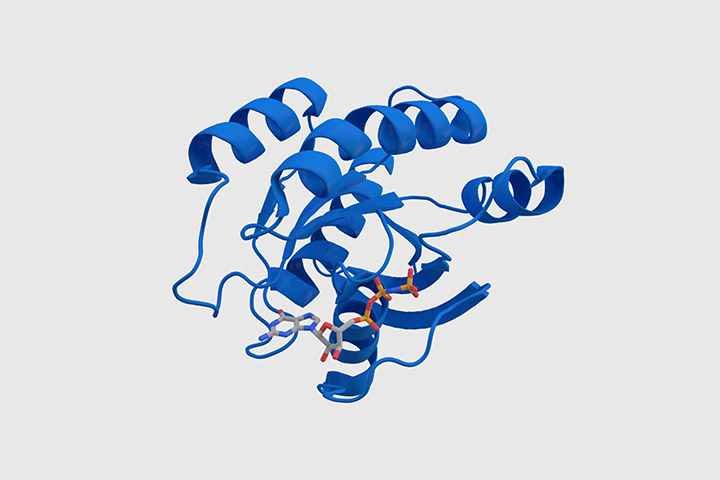A New Combination Targeting the RAS Pathway

Thomas Splettstoesser; Wikimedia Commons
Can two new drugs combined with standard care to create a joint effect in killing tumor cells in patients with metastatic pancreatic cancer?
Mutations in the RAS genes occur in the majority of cancer types. In fact, more than 90 percent of pancreatic cancer patients carry a mutation in the KRAS gene (one of the three RAS genes in humans). RAS genes play an important role in cell signaling pathways driving many cellular processes, including cell growth; when RAS genes are mutated cells grow uncontrollably, evading signals to die. The complexity of the RAS pathway makes it very hard to target. Blocking any single key component in this pathway is generally not enough to halt the spread of cancer because tumor cells either reactivate the RAS pathway in cells with new mutations resistant to the inhibition or activate parallel/compensatory pathways to survive.
Researchers are hopeful that a new combination of drugs will overcome this hurdle and work synergistically with chemotherapy to create a more complete and durable response in pancreatic cancer treatment.
How the Two Drugs Work
Avutometinib (VS-6766) targets RAF and MEK proteins, two key molecules in the RAS pathway, blocking tumor growth and proliferation. In earlier trials, it demonstrated favorable tolerability, which may help patients stay on therapy longer. The drug has been tested in other cancers with KRAS or related mutations, including non-small cell lung, gynecologic, and colorectal cancers, as well as some melanomas and breast cancers, with promising early results.
When RAF and MEK proteins are inhibited, tumor cells switch to another parallel pathway that is driven by the focal adhesion kinase (FAK) protein. Defactinib (VS-6063) is a selective FAK inhibitor that inactivates the parallel signaling pathway and has demonstrated synergy with avutometinib in killing tumor cells. The U.S. Food and Drug Administration (FDA) granted Orphan Drug Designation to the combination treatment in July 2024, and initial results from the first patients on the trial were reported at the 2024 American Society of Clinical Oncology conference in May.
How the Trial Works
This phase I/II study is assessing the safety and efficacy of avutometinib and defactinib in combination with the standard-of-care chemotherapy regimen (gemcitabine and nab-paclitaxel) in patients with advanced or metastatic pancreatic adenocarcinoma. Patients who had previous treatments and those with pancreatic neuroendocrine tumors are not eligible to participate.
The study is evaluating different dose and schedule combinations to determine the recommended dose for the second part of the trial, which will analyze overall response rates as a measure of the treatment’s effectiveness.
We encourage you to consult your physicians for clinical trials that may be right for you. The website ClinicalTrials.gov provides more details about this trial as well as many others. You can visit the Let’s Win Trial Finder for a list of all active pancreatic cancer clinical trials.





